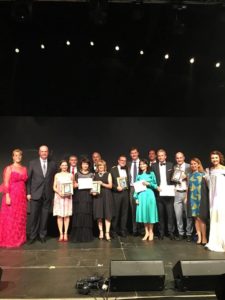ROMANIA REMAINS A CHOICE DESTINATION WITH MULTIPLE ADVANTAGES FOR FRENCH INVESTMENT
 Since 2014, you have been Consular Counsellor for Romania and Moldova, could you tell us about your exceptional professional background and explain to us what your missions are?
Since 2014, you have been Consular Counsellor for Romania and Moldova, could you tell us about your exceptional professional background and explain to us what your missions are?
Indeed, there are many links between my professional background and the representation of the French in Romania. It all started after the fall of the communist regime of Bucharest in 1990. As a French lawyer registered with the Paris Bar, I was called to assist a large French group to settle in Romania, I then started collaborating with one of the BIG4 to carry out legal audits for privatizations in Romania. The first projects were followed by others, year after year, as more French companies became interested in Romania.
I have assumed the mission of building bridges between the two countries, both of which I feel strongly attached to, by my birth and my education.
In 2002, I opened the Bucharest Cabinet, which quickly established itself as one of the first French-speaking law firms in the country, led by lawyers with a dual Franco-Romanian legal culture.
My contact with French expatriates in Romania, with the community to which I belong, has always been important. I never turn my phone off. It’s a habit and not a strategy. Secondly, I have always encouraged exchanges between the two countries, convinced that our common values and our historical ties are the guarantee of the best partnership that can exist between France and Romania.
It is to this end that I have always been a volunteer partner in initiatives aimed at encouraging social-cultural and economic exchanges, as a lawyer or member of the CCIFER Board of Directors.
In this context, I have also accepted to apply for a position of Consular Counsellor of France. The Consular Counsellor is a kind of elected representative of the French community abroad who, by the force of the permanent contact with the concerns of this community, acts as spokesperson and interface with the French consular or parliamentary authorities.
In 2014, I was therefore elected by the French from Romania and the Republic of Moldova, Consular Advisor, along with two other colleagues for a six-year term. Our honorary mandate is also unprecedented because we must combine our efforts with diplomacy and at the same time ensure that we do not overstep the latter’s powers. As a Consular Advisor, we are also the electors of the 12 Senators representing French people living outside France.
Even if we do not have specific skills, we serve as a bridge for the issues in our areas of intervention: social protection, education and vocational training, the response to practical questions asked almost daily by the community of Romania and Moldova.
Finally, the Consular Counsellors take on a voluntary mission to support French actions in Romania and we can sometimes accompany the Consul or the Ambassador in their various trips and public actions.

In 1991, you founded one of the first French-speaking law firms specializing in business law in Romania, what are your views on the business world today and on Franco-Romanian exchanges?
In less than 30 years, a fairly short period from a historical perspective, Romania has had an extraordinary journey. It has succeeded in rebuilding, despite its inherent back-and-forth, a functional market economy, and has put in place a modern financial system and institutions compatible with the functioning of Western democracies. This only proves the immense recovery power of this extremely talented people, driven by authentic European values.
For several years already, the Romanian economy has accelerated momentum beyond the European average, deploying a range of business opportunities for investors.
The French were among the first to succeed. Most CAC 40 companies and many of their suppliers or dynamic SMEs are present (Airbus, Auchan, Carrefour, Crédit Agricole, Michelin, Orange, Renault, Société Générale, Total, Véolia, etc. …). These companies have an important contribution to the country’s economy.
Other French companies are encouraged to discover this Eastern European country with high potential, because there is both a common political will and extremely encouraging figures: GDP growth of 6.9% in 2017, the largest in the EU, a consumer-friendly market (2/3 of Romania’s GDP), a still soft taxation (16% corporate tax and 10% income tax), important natural resources, geographical proximity and… more than 600 years of Franco-Romanian common history.
Romania has always been driven by the desire to be a major player in its region and France has always been a model and a privileged partner of this country. Many of the country’s modern institutions were created according to a French model, as well as its administrative organization, and even its legislative system. The Romanian Civil Code was inspired by the Napoleonic Code…
French investors are thus fortunate enough to integrate in Romania the largest Francophone community in the region and to showcase their know-how in sectors where Romania needs investments most: health, infrastructures, education, services, tourism, agriculture and agribusiness.
In return, Romania shows a greater willingness to offer a legal framework that favours foreign investment. The country has recently adopted new public procurement legislation, a new PPP law and a number of tax facilities – legislation designed to protect investors and help them fight corruption.
Finally, in the new global security context, Romania offers some political stability and commitment to European values, even though the approach of an election period in 2019 sometimes gives rise to declaratory slippages.

Romania has entered the European Union for a little over 10 years, what significant changes have taken place? What conclusions can you draw?
If we consider the date of accession of Romania to the European Union the period that begins 10 years before 2007 (the date of admission as a full member of the EU) and ends today, the impact is easy to quantify. A simple recourse to the figures shows that the country’s GDP has increased five times between 1998 and 2018, exportations – eight times, inflation has fallen, the unemployment rate has also fallen significantly, and the wage gain has increased sharply.
Accession to the European Union has therefore greatly benefited Romania. It also benefited Europe, which had made the decision to expand to the East due to a need to broaden its market and to introduce new partners for further development. Let us also not forget that the migration of the Romanian workforce has also benefited a Europe that is a prey to an accentuated aging of its population.
If we add to these aspects the fact that the integration has allowed Romania to diversify its financial resources (structural, cohesion or development funds) and to access the largest commercial market, with the largest GDP in terms of buying power, then we have the image of a country for which the EU is a conduit for resources.
On the external front, EU and NATO member status has helped Romania gain credibility in the eyes of investors, who have made long-term and sustainable investments in the country.
The integration of Romania has been a success for the country and for Europe, even if two other objectives – integration in the Schengen area and the adoption of the single currency – have not yet been achieved.
Many different causes are to blame and they have a connection with the difficult pace of internal reforms in some areas in Romania, the mismanagement of the social and economic costs of the country’s transition period, superimposed on the deepest crisis period experienced by the European Union in 2008, and even after that, since in turn it had to change the rules of the game, especially in monetary policy and security.
Romania is now showing a booming economy, is discovering a pool of talent, which justifies the choice of major international groups to install their regional development centres here, as was the case of Renault, in a country that has taken steps to recognize the fundamental rights of citizens, that stands for the protection of property and which is about to assume for the first time the Presidency of the Council of the European Union from 1 January 2019.

Finally, on the eve of major European elections, what are the major stakes for Romania and Europe and what message do you wish to address to French companies in Romania and those who would like to establish their companies there?
Romania, like Europe, is facing a new turning point in its existence.
Both must affirm themselves as credible voices, protect themselves from populism and corruption, and prove their strength in proposing viable partnerships and joint projects.
I cannot predict the future, but I can say that Romania remains a destination for French investments, one with many advantages: it is a country open to foreign investment, which can provide an educated and accessible workforce. Finally, the potential for development is great in almost all areas of activity, with the promise of a return on investment difficult to achieve elsewhere in Western Europe.
I strongly encourage all those who have investment projects to seriously consider Romania, because we must not lose sight of the fact that in business the results of tomorrow are the effect of today’s actions. As Antoine de Saint-Exupéry said, “As far as the future is concerned, it is not a question of foreseeing it, but of making it possible.”
November 2018
www.gruiadufaut.com

















